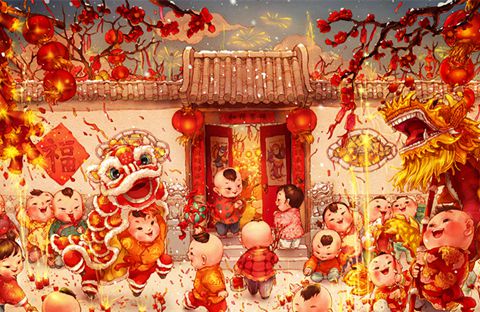春节•元宵诗词英译,这样聊年才地道

又是一年春节时,作为中国最重要的传统节日,有不少诗人曾为它吟诗作赋,今天就来看看古人是怎么写春节和元宵的。
别岁
Farewell to the Old Year
故人适千里,临别尚迟迟。
When an old friend is to go far away,
Long, long will he linger before he parts.
人行犹可复,岁行那可追。
Though gone away, he may come back someday.
Where can we find the old year once itdeparts?
问岁安所之,远在天一涯。
May I ask whither the old year has passed?
At the end of the earth it leaves no track.
已逐东流水,赴海归无时。
It is gone with the water flowing fast
To the East Sea and will never come back.
东邻酒初熟,西舍彘亦肥。
Wine is warmed by our neighbors on the east
And the pork of those on the west is fat.
且为一日欢,慰此穷年悲。
I’d like to have one happy day at least
So that the lean year may not be grieved at.
勿嗟旧岁别,行与新岁辞。
Do not sigh for the departing old year!
Soon we shall say goodbye to New Year’s Day.
去去勿回顾,还君老与衰。
Do not look back but let them disappear.
Man will grow old and his powers decay.
——苏轼
——translated by Xu Yuanchong
赏析:
这是苏轼冬末写的组诗之一,其一《馈岁》,其二是本篇《别岁》,其三就是下一首《守岁》。
组诗的原题为:“岁晚相与馈问,为‘馈岁’;酒食相邀,呼为‘别岁’;至除夜,达旦不眠,为‘守岁’。蜀之风俗如是。余官于岐下,岁暮思归而不可得,故为此三诗以寄子由。”
此时苏轼一人在凤翔为官,临近年末,想回汴京和父亲、弟弟团聚而不可得,回想故乡岁暮的淳朴风俗,就写了这三首诗抒发思念之情。
故人离别,纵使远去千里,还能再见,但分别总是难忍。一年又要过去,恍惚岁月已晚,相去万余里,各在天一涯。
东邻、西舍、酒熟、猪肥,热闹欢饮,每到要辞旧迎新时,才知时光流逝有多快。
守岁
Staying up All Night on New Year’s Eve
欲知垂尽岁,有似赴壑蛇。
The end of the year is drawing near
As a snake crawls back to its hole.
修鳞半已没,去意谁能遮。
We see half its body disappear
And soon we’ll lose sight of the whole.
况欲系其尾,虽勤知奈何。
If we try to tie down its nail,
We can’t succeed whate’er we do.
儿童强不睡,相守夜欢哗。
Children will stay up and regale
Themselves with feast the whole night through.
晨鸡且勿唱,更鼓畏添挝。
Cocks, wake not the dawn with your song;
Drums, do not boom out the hour now!
坐久灯烬落,起看北斗斜。
The wick is burned as I sit long,
I rise to see the slanting Plough.
明年岂无年,心事恐蹉跎。
Will there be no New Year’s Eve next year?
I am afraid time waits for none.
努力尽今夕,少年犹可夸。
Let us enjoy tonight with cheer
So that childhood will longer run.
——苏轼
——translated by Xu Yuanchong
赏析:
这首《守岁》与上一首相联系,又生动地用蛇作比,旧岁既然要走,去意是挡不住的,即便我们要努力挽留,亦是于事无补。
千百年来,守岁已成习俗。一家人围炉而坐,幼童想打磕睡,还要勉强欢闹。待得晨鸡唱响,新的一日到来,旧岁真正远离。
灯烛已燃到最后,星辰西落,新年或许也有烦忧,但尽享此刻的欢乐才最重要。
青玉案·元夕
Green Jade Cup
Lantern Festival
东风夜放花千树。更吹落、星如雨。宝马雕车香满路。凤箫声动,玉壶光转,一夜鱼龙舞。
One night's east wind adorns a thousand trees with flowers
And blows down stars in showers.
Fine steeds and carved cabs spread fragrance en route;
Music vibrates from the flute;
The moon sheds its full light,
While fish and dragon lanterns dance all night.
蛾儿雪柳黄金缕。笑语盈盈暗香去。众里寻他千百度。蓦然回首,那人却在,灯火阑珊处。
In gold-thread dress, with moth or willow ornaments,
Giggling, they melt into the throng with trails of scents.
But in the crowd once and again
I look for her in vain.
When all at once I turn my head,
I find her there where lantern light is dimly shed.
——辛弃疾
——translated by Xu Yuanchong&Xu Ming
赏析:
你或许不读辛弃疾,却不能不知“众里寻他千百度。蓦然回首,那人却在,灯火阑珊处。”
这样的诗句又有几人不知呢?
传统的新年须得从初一过到十五才算,元宵一过,年味儿才逐渐远去。正月十五,满城灯火,大街小巷人头攒动,笑语喧哗。
古时的元宵又称上元节,那可是各家姑娘不受约束可以出门的日子,未婚的少女都无比期待这一天的到来。
穿衣打扮、猜灯谜、偷偷觑一眼心上人,心头犹如东风吹散的千树繁花。
烟火纷纷,乱落如雨,马车驶过,满路芳香。凤箫悠扬,明月西斜,火树银花,盈盈人间。
我在人群中一遍遍寻觅意中人的身影,猛然回首间,那人却在灯火昏暗处。
王国维《人间词话》曾言人之成大事业者,必皆经历三个境界,而《青玉案·元夕》的境界则是最高境界。
你还读过哪些跟春节和元宵有关的诗歌呢?